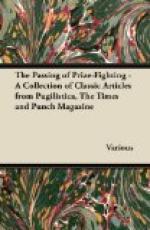Miss MARIE LOeHR herself came very well out of a play that can hardly add to the author’s reputation. Her personality lent itself to a part which demanded a blend of feminine charm with a boyish contempt for romance. And she had a few good things to say. It was not Mr. HALLARD’S fault if he failed to win our perfect sympathy for a hero whom the heroine addressed as “Spats.” As for Mr. BASIL RATHBONE, who played the part of Harold Glaive, I cannot imagine why he took it on. Apart from his timorous declaration of love, conveyed on a typewriter, there was no colour in it, and nothing whatever to show why his passion petered out. I think that the author, in his surprise at the success of Harold’s rival, must have forgotten all about it. Mr. HERBERT ROSS was excellent as Dahlia’s father, a pleasantly futile baronet under the thumb of a sour-tongued managing female, an old-fashioned part in which Miss HELEN ROUS has nothing to learn. Miss VANE FEATHERSTON, as the lady who finally absorbed the baronet, did her little gratuitous piece all right.
I cannot get myself to believe that all these intelligent actors are under any illusion as to the merits of the comedy. With the best wishes in the world for the success of Miss MARIE LOeHR’S enterprises, I am bound to regard it as yet another instance of a play where the attractions of the leading part have a little deranged the judgment of the actor-manager.
O.S.
* * * * *
[Illustration: Richard Petafor (Mr. HUBERT HARBEN), the apostle of Materialism and Physical Exercise, trying to convert Antony Grimshaw (Mr. HERBERT MARSHALL), the believer in Mysticism and Armchairs.]
* * * * *
“THE CROSSING.”
Mr. ALGERNON BLACKWOOD and Mr. BERTRAM FORSYTH (assisted by Mr. DONALD CALTHROP) present to us in The Crossing a certain Mr. Anthony Grimshaw, a princely egotist of the poetic-idealist type who gets up on the hearth-rug and says to his family, “I am a humanitarian before everything,” and things like that, and then wonders why his wife is estranged from him. He has a daughter, Nixie, who is not old enough to know how bad all this is, and together they hear the wind singing glees without words (or in Volapuk, but anyway not intelligible to us poor normals), a thing Mr. ALGERNON BLACKWOOD has been doing or pretending to do for years without once taking me in.
Anthony is run over and (as we say) dies. After an extraordinarily tiresome conversation in the morning-room with his friend and his son and his mother (who are also what people call dead) it dawns upon him that something odd has happened to himself also. His wife and two children, after his (so-called) death, become blissfully happy and set to work to finish his book, that being, as they think, his wish. Well, I wonder. At any rate in death (as we say) he was not divided—from his egotisms.




